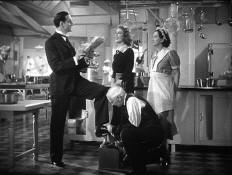
Ellen and Patsy are delighted to tell Wroxton they are going to Maine
with the Winfields. |
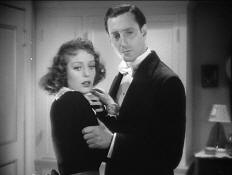
Ellen is again fighting off unwanted advances. This time, the dog helps
her. |
"Basil Rathbone, who probably has been about the meanest of the
screen's arch-villains, has had a change of heart. Called upon to poison a
dog in a scene for 'Private Number' for 20th Century Fox, Basil refused
and the script was rewritten so that someone else drew the assignment.
'I'll menace the heroine and I'll torture the hero,' said Basil, 'but
black as I am, I won't poison a dog.'" —Modern Screen, July 1936
"Private Number" with Loretta Young and Robert
Taylor Excellent mass entertainment, with a particular appeal
for women, because of the romantic theme. The fact that the plot is
ordinary will, no doubt, be overlooked by audiences, for the
production, direction, and acting are of the highest order. And the
personal charm and popularity of both Robert Taylor and Loretta Young
should, in itself, bring patrons to the box-office. Miss Young wins
the spectator's sympathy at the very beginning and retains it
throughout. the courtroom scene, in which she is shown trying to
protect her good name for the sake of her child, should touch one
deeply. there are several sex situations, but they have been handled
cleverly and tactfully. Audiences should be highly amused by the
antics and wisecracks of Patsy Kelly; her comedy lines are perfectly
timed and relieve the tenseness in several situations:
Miss Young, personal maid to Taylor's mother, repulses the advances
of Basil Rathbone, the head butler. She innocently becomes involved
with Monroe Owsley in a raid on a questionable house and is arrested.
She telephones to Rathbone for help; he arrives at the jail and pays
her fine. Again he suggests to her the advisability of her being
"pleasant" to him. Taylor notices Miss Young and is impressed. When
the family leave for Maine for their vacation, they take Miss Young
and Patsy with them. There the romance between Taylor and Miss Young
develops and they are married secretly. He returns to college in the
Fall. A spiteful maid discloses to Rathbone that Miss Young is to
become a mother. He rushes with the news to his employers and when
Miss Young is brought before them, she is upbraided. Patsy rushes to
her defense and blurts out the fact that their own son is Miss Young's
husband. Rathbone, furious, informs them that Miss Young has a police
record and shows them the receipt for the fine he had paid. Miss Young
is unable to convince them that she had been innocent and leaves. She
is taken in to the home of old friends where her baby is born. She is
brought to court on annulment proceedings and things look bad for her
because of the false testimony given against her by Owsley, who had
been bought off by Taylor's father. Through a clever ruse, Owsley is
forced to tell the truth, thereby clearing Miss Young. Eventually she
and Taylor are reconciled.
Cleves Kinkead wrote the story, and Gene Markey and William
Conselman the screen play. Roy Del Ruth directed it, and Raymond
Griffith produced it. In the cast are Joe Lewis, Marjorie Gateson,
Paul Harvey, Jane Darwell, and others.
Because of sex suggestiveness it might be unsuitable for children
and adolescents. Good for adults. Class B.
—Harrison's Reports, June 13, 1936 |
"Robert Taylor and Loretta Young marry secretly as she is a maid in his
rich household. Basil Rathbone causes trouble. Aside from the wilted
story, you will see just about the nicest romantic sequences ever filmed." —Photoplay, August
1936
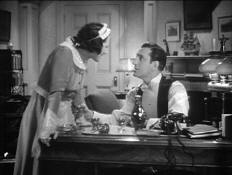
One of the kitchen staff tells Wroxton that Ellen is pregnant. |
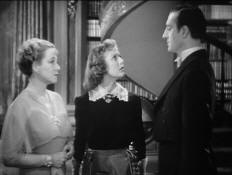
Wroxton accuses Ellen of immoral behavior. |
"Mr. Rathbone is as hateful as Miss Young is charming."
—The New York Times, June 12,
1936
Private Number
Romantic Drama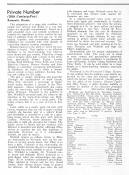 This adaptation of a stage play combines romantic
love interest and drama in a way that makes for desirable
entertainment. Based on a well grounded story and soundly produced, it
contains the ingredients in story content for any kind of audience
from the teen age up. In this quality, together with personalities
presented, exhibitors are provided with wide latitude in concocting
interest creating campaigns.
Human interest is the pitch to which the production is keyed. That
quality is an effective attribute to its heart-warming love interest,
tense drama and gay comedy. Played by a large cast, it permits
about half a dozen of the members, particularly Robert Taylor, Loretta
Young, Basil Rathbone, Patsy Kelly, Joe Lewis, Marjorie Gateson,
Monroe Owsley and John Miljan, to contribute exceptional performances.
In Rathbone, the heavy, it offers a menace almost certain to have
audiences hooting, hissing and yelling for his scalp.
The plot is simple, intriguing and powerful. Through the
machinations of maid Gracie, Ellen Neil, obviously a personage of
higher social status, becomes a servant in the Winfield mansion.
Almost immediately she comes under the terrorizing spell of chiseling,
lustful butler Wroxton. Elevated to the position of Mrs. Winfield's
personal maid, she comes to the attention of the home-from-college
son, Richard, who mistakes her for a party guest. The action evinces
that it is a case of love at first sight.
Later, while on a maids' night out lark with Gracie, sequences that
are full of gayly exciting comedy, she becomes part of a sailors'
brawl and eventually is arrested in a raid on a gambling house where
she has gone with pick-up Coakley. Wroxton, whose advances she has
been able to fight off, procures her release. The family moves to
Maine and the romance with Richard is beautiful and idyllic, although
Ellen strives to convince the boy that marriage is impossible.
However, as it is subsequently learned, the pair do marry.
Richard returns to college, letters to Ellen are intercepted by
Wroxton, who via the medium of servant gossip learns that Ellen is to
have a baby. Unaware of the relationship, the vengeful butler accuses
the girl of promiscuousness, citing the arrest incident as proof.
Though Mrs. Winfield is tolerant, Mr. Winfield rises in wrath and
demands Ellen's dismissal as a gold digger when she acknowledges her
marriage. As he institutes annulment proceedings, Ellen, advised by
Gracie and her boy friend Smiley, hires shyster lawyer Stapp to
protect her interests. As Winfield goes after the girl with hammer and
tongs, Richard meets her, to be convinced that charges made against
her character are true.
In a suspense-packed court scene, all evidence goes against girl,
particularly as Coakley turns traitorous perjurer. But when the
witness is trapped in a lie, he turns yellow and pleads with Richard
to save him. Taking the floor, Richard demands that the case be
dismissed inasmuch as all was inspired by villainous Wroxton, who,
though claiming he was only seeking to protect family name, actually
was motivated by desire for personal revenge. The finale has husband
and wife reunited as he berates Wroxton and Winfield begs for
Ellen's forgiveness.
Showmanship calls for proper explanation of entertainment value.
The tools are at hand in story content and personalities presented,
with Taylor whose popularity is increasing by leaps and bounds,
Loretta Young, Rathbone and Patsy Kelly. It can be sold either as a
tense drama or a heart-touching romance, especially for adults.
Previewed in the Westwood Village Theatre. It was evident that
the audience was visibly impressed by the class and finished manner in
which the picture was produced. quickly swept into the spirit of the
romance between Taylor and Miss Young, it didn't hesitate audibly to
express its opinion of the character presented by Rathbone.
McCARTHY, Hollywood
— Motion Picture Herald, May 30, 1936 |
"Loretta Young and Robert Taylor are just about the last word in youth,
good looks, and sex appeal in this hokum 'meller.' ... Their sincerity,
plus oily villainy by Basil Rathbone, comedy by Patsy Kelly and Joe Lewis,
make it surefire as romance and entertainment."
—Screenland, August 1936
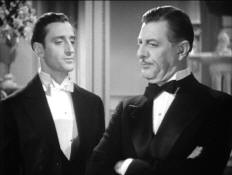
Wroxton and Mr. Winfield (the father) |
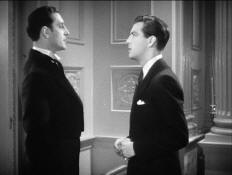
Wroxton and Dick Winfield (the son) |
"Young is charming as a maid who becomes romantically involved with her
employers' son (Taylor), causing various complications. Rathbone is
effective as the villain in this otherwise OK melodrama."
—Leonard Maltin, Leonard Maltin's Classic Movie Guide
"Private Number"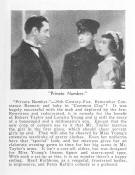 Remember Constance Bennett
and baby in "Common Clay"? It was hugely successful with the mob and
deplored by the few. Rewritten and redecorated, it is remade for the
benefit of Robert Taylor and Loretta Young and is still the story of a
housemaid and a millionaire's son. Except tht the new crop of censors
see to it that Mr. Taylor marries the girl in the first place, which
should cheer servant girls no end. They will also be cheered by Miss
Young's extensive wardrobe of pretty clothes. Even her uniforms have
that "special" look, and her mistress gives her an elaborate evening
gown in time for her big scene in Mr. Taylor's arms. It isn't a
cast-off, either, but was designed for Miss Young's lissom figure and
starry-eyed type. With such a set-up as this, it is no wonder there's
a happy ending. Basil Rathbone, as a vengeful, frustrated butler, is
impressive, and Patsy Kelly's comedy is a godsend.
Norbert Lusk
—Picture Play, September
1936 |
Motion Picture Daily (June 16, 1936) reported that moviegoers in
Boston hissed at Basil Rathbone on the screen. they must have been delighted
to see the scene in which Robert Taylor punches Rathbone in the jaw. In an
interview with Screenland magazine (December 1936), Basil Rathbone showed a
journalist a letter he received from a girl in Ohio. It read: "Having seen you in all your films, I am highly satisfied you have got
your desserts at last. when Robert Taylor struck you, I said 'Thank
goodness, that's done for the beast now.'"
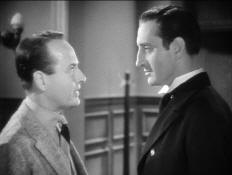
Coakley refuses to lie for Wroxton. |

Winfield is about to punch Wroxton in the face. |
"Picture is well cast, but the players have a difficult time trying to
revitalize some of the antique episodes of the plot ..."
—New York Daily News
Return to Page One. See Page Three for pictures of posters,
lobby cards and promo photos.
|
Private Number is available on DVD
|
|


















